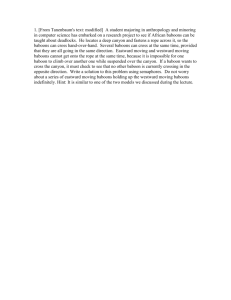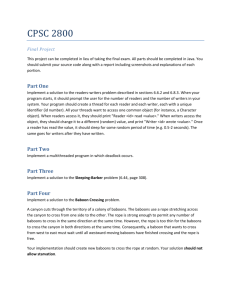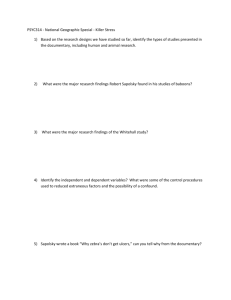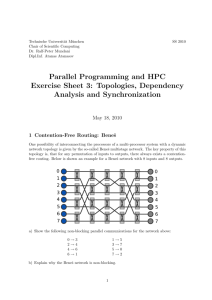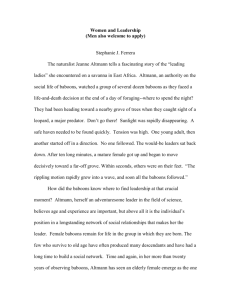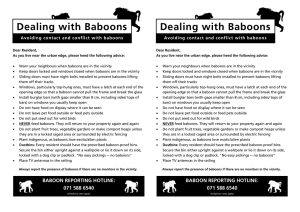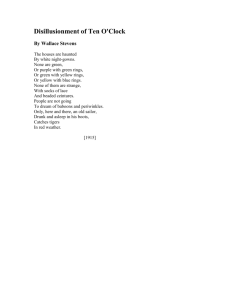Information regarding alleged illegal activities against baboons
advertisement
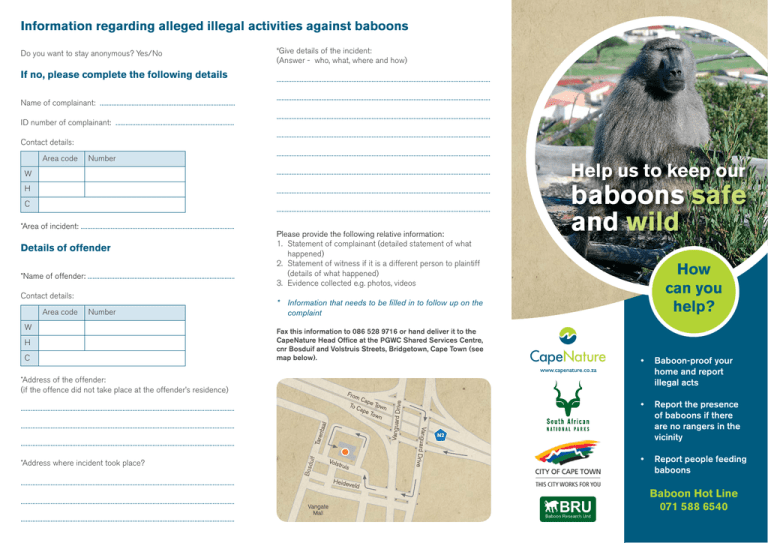
Information regarding alleged illegal activities against baboons Do you want to stay anonymous? Yes/No If no, please complete the following details Name of complainant: ................................................................................. ID number of complainant: ....................................................................... ................................................................................................................................ ................................................................................................................................ ................................................................................................................................ ................................................................................................................................ Contact details: Area code “Give details of the incident: (Answer - who, what, where and how) Number ................................................................................................................................ W ................................................................................................................................ H ................................................................................................................................ C ................................................................................................................................ *Area of incident: ............................................................................................ Details of offender *Name of offender: ........................................................................................ Contact details: Area code Number W H C Please provide the following relative information: 1. Statement of complainant (detailed statement of what happened) 2. Statement of witness if it is a different person to plaintiff (details of what happened) 3. Evidence collected e.g. photos, videos Help us to keep our baboons safe and wild How can you help? * Information that needs to be filled in to follow up on the complaint Fax this information to 086 528 9716 or hand deliver it to the CapeNature Head Office at the PGWC Shared Services Centre, cnr Bosduif and Volstruis Streets, Bridgetown, Cape Town (see map below). • Baboon-proof your home and report illegal acts • Report the presence of baboons if there are no rangers in the vicinity • Report people feeding baboons *Address of the offender: (if the offence did not take place at the offender’s residence) ................................................................................................................................ ................................................................................................................................ N2 ................................................................................................................................ *Address where incident took place? ................................................................................................................................ ................................................................................................................................ ................................................................................................................................ Baboon Hot Line 071 588 6540 Keep baboons off your property Joint management of baboons on the Peninsula ALWAYS • Plant indigenous • Keep doors locked and windows closed when baboons are in the vicinity • Install night bolts into sliding doors • Ensure that windows, particularly top-hung ones, have a latch at each end of the opening edge to prevent baboons from pulling the frame and breaking the glass • Install burglar bars with gaps smaller than 8 cm, including sides and tops of bars on windows you usually keep open NEVER • Feed baboons. They will return to your property again and again • Leave any food or seeds on display where they can be seen • Plant fruit trees, vegetable gardens or make compost heaps unless they are in a locked caged area or surrounded by electric fencing Chacma baboons form part of our rich biodiversity and heritage. The Peninsula baboon population is growing steadily and is not endangered or under threat. In 2009, the population stood at 385 and at the end of 2011, the population census recorded that the baboon population was 475. Partnerships between the authorities and communities are critical to ensure a sustainable baboon population in the natural areas of the Peninsula. Safeguard your bin • Secure both latches with padlocks or clips at all times • Secure your bin lid with a strap, rope or chain • Knock a pole in the ground and attach your bin to the pole. The bin must be raised off the ground. • Store your bin in the garage or in a caged area • Lie the bin on its side – locked The City of Cape Town, South African National Parks (SANParks) and CapeNature, known collectively as the Baboon Technical Team (BTT), have joined hands to ensure a sustainable baboon population. A wide range of City of Cape Town residents are elected to the Baboon Liaison Group (BLG) which is made up of representatives from affected communities. The BLG meets regularly with the BTT and researchers from the BABOON RESEARCH UNIT (BRU) to discuss a range of issues related to protecting baboons, such as retribution by residents, which includes injuries from pellet guns, poisons, dogs and car injuries. The City of Cape Town is also mandated to protect residents and visitors from raiding baboons. The City has contracted the services of Human Wildlife Solutions to minimise conflict between humans and baboons. What happens to raiding baboons? Anyone caught feeding baboons could face a year’s imprisonment, a fine of up to R5 000 or both. Shooting at baboons with paintball guns or any other weapon without a permit could result in two year’s imprisonment, a fine of up to R10 000, or both. The goal of management is zero spatial overlap between baboons and humans as both parties stand to lose when they share space. If baboons manage to evade the field rangers and raid regularly it lowers their welfare and conservation status while also posing a risk to human health and property. Every effort will be made to try and prevent baboons from becoming habitual raiders and only when this fails will such baboons be euthanised after due consideration of all the relevant facts. Please report alleged illegal activities against baboons — see form overleaf For more information please contact Dr Elzette Jordan, City of Cape Town, Tel: 021 851 6982. Laws protecting baboons Baboons are protected under the Nature Conservation Ordinance 19 of 1974. It is illegal to feed or hunt baboons without a permit. Let’s join hands to keep our baboons safe and wild.
